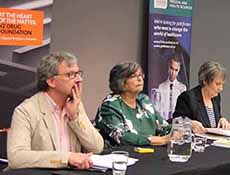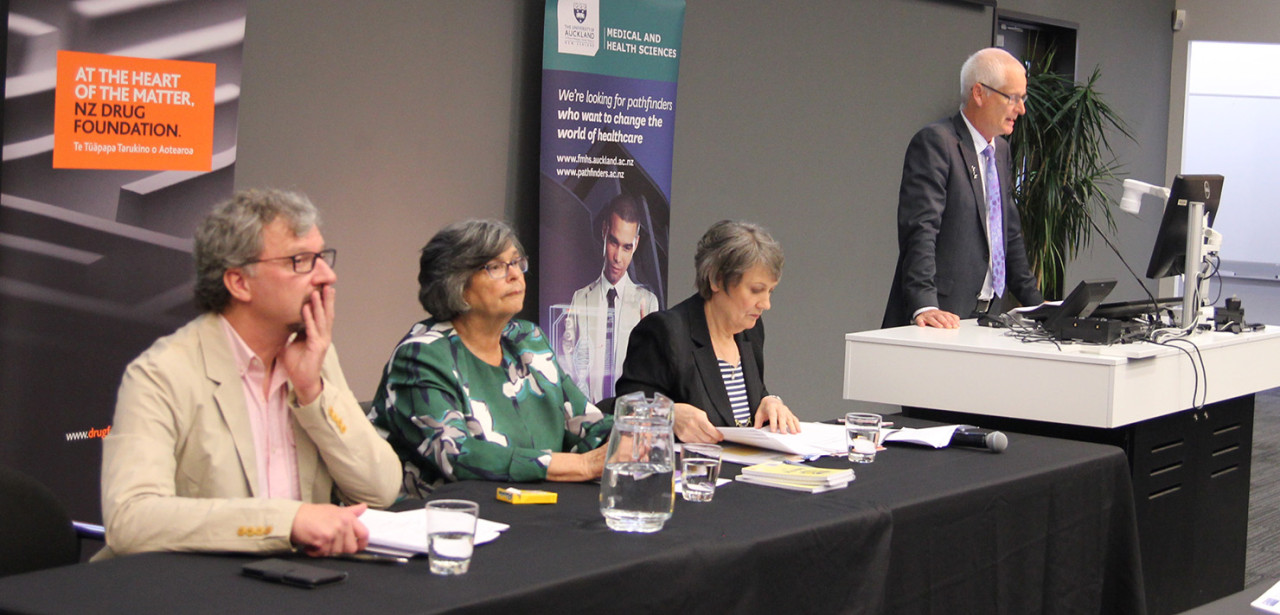Taking the lead on drug regulation


Professor Benedikt Fischer, Ruth Dreifuss and Helen Clark listen to Auckland University's Faculty of Medical and Health Sciences Dean Professor John Fraser (speaking). - Over 200 people attended the Global Commission on Drug Policy's public talk at Auckland University.
New Zealand has a chance to do something truly innovative again.
If we see adversity as breeding innovation, then New Zealand is on the cusp of breaking new ground – as we did in the 80s when we led the world in the development of peer-led needle exchange programmes.
Last week, two world leaders on international drug policy shared some very practical views on how drug regulation can move from theory to reality. Our own former Prime Minister Helen Clark joined former Swiss President Ruth Dreifuss, now the Chair of the Global Commission on Drug Policy, at a public talk hosted by University of Auckland Faculty of Medical and Health Sciences.
Watch a recording of the livestream here
A new report from the Global Commission raises the question: Who should be in control of substances that pose serious health risks – the state, or organised crime? The Commission forcefully argues that governments must regulate the criminal black market out of existence.
Far from appearing radical, the two women’s wealth of practical experience put a very pragmatic face to drug policy. The result was a compelling public talk, after which they answered questions from the 200-plus audience. The session was chaired by Professor Benedikt Fischer, the university’s newly-arrived Hugh Green Foundation Chair in Addiction Research.
While here, Mme Dreifuss and Ms Clark discussed policy with both government and opposition MPs, talked with NGOs, and explained their position through the media. They also took time to visit the drug treatment unit at Arohata Women’s Prison, where they listened as some of the women shared their own personal stories of adversity and success.
Mme Dreifuss was in charge when Switzerland introduced groundbreaking changes to overcome a heroin epidemic in the 1980s and 90s. Heroin consumption spaces were set up, and heroin given on prescription to those struggling with addiction. The results have been both positive and far-reaching Numbers with HIV infections dropped dramatically, mortality rates fell, fewer young people tryheroin and over 70 percent of those with a current addiction are now in substitution therapy. Dreifuss describes the measures as a highly restrictive form of regulation.
In New Zealand we are facing our own public health emergency, with the synthetic cannabinoid crisis showing no sign of magically disappearing. There’s no doubt it’s time to revisit our outdated drug laws, and introduce a comprehensive suite of harm reduction and social initiatives. It remains to be seen whether the political will exists to introduce the measures necessary to tackle the problem. While here, Ms Clark commented that New Zealand is “well behind” on lifesaving drug reform. She’s right of course – but maybe that’s exactly where we need to be, in order to get us looking ahead once again.
GCDP: Regulation – The responsible control of drugs
Watch the recorded livestream: Regulation: Responsible Control of Drugs - Public Talk.
Media coverage:
RNZ: Regulation vs the War on Drugs
Newstalk ZB: Jack Tame: The war on drugs is not working
Newshub: New Zealand ‘well-behind’ on lifesaving drug reform – Helen Clark
TVNZ Breakfast: The coalition government has promised a referendum on legalising cannabis, but what about decriminalising all drugs?
95bFM: Drug Regulation over prohibition (part 1 w/ Ruth Dreifuss, October 29)
The Spinoff: The war on drugs is killing Kiwis – we must choose a different approach
Recent news

Reflections from the 2024 UN Commission on Narcotic Drugs
Executive Director Sarah Helm reflects on this year's global drug conference
What can we learn from Australia’s free naloxone scheme?
As harm reduction advocates in Aotearoa push for better naloxone access, we look for lessons across the ditch.

A new approach to reporting on drug data
We've launched a new tool to help you find the latest drug data and changed how we report throughout the year.

